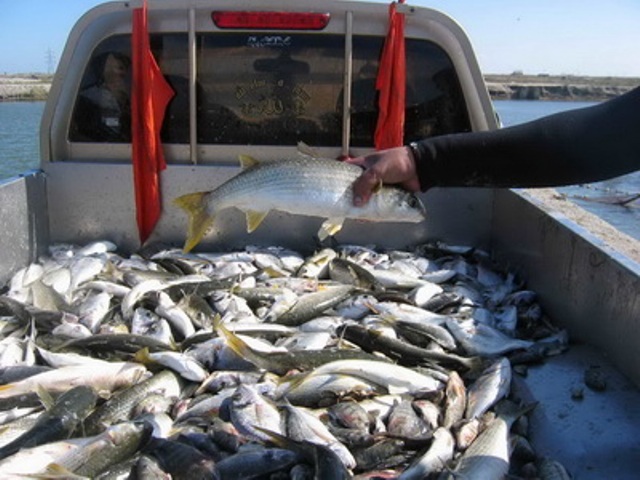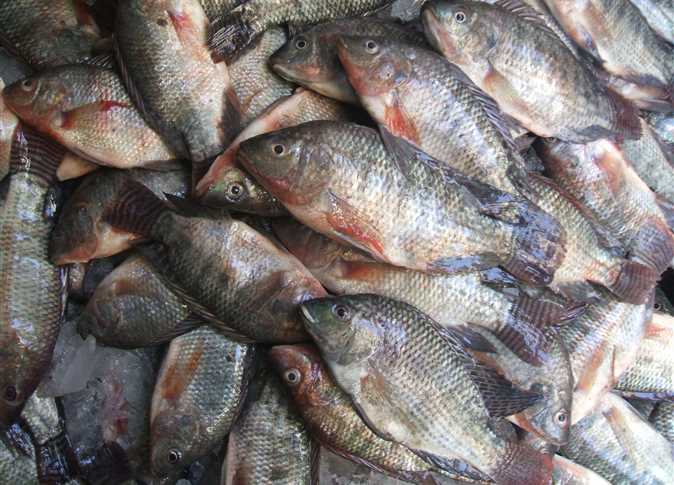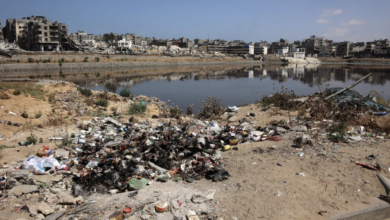
Although experts often advise that people eat fish three times a week, in Egypt, you might think twice before taking such a risk. Many local fish farms have been found to use sewage water that causes serious diseases.
Sherif Sadek, founder and manager of the Agriculture Consulting Office, says only a limited percentage of fish farms use sea or underground water. More than 95 percent of fish farmers use excess wastewater from agricultural lands, which accumulates in sewage channels after farmers irrigate — and it’s legal.
“Legally, there are three water sources that are allowed to be used in the fish farms in Egypt: agricultural sewage water, well water and seawater,” Sadek says.
Dr. Mohamed Sayed Marzouk, professor of aquaculture and fish diseases at the Cairo University faculty of veterinary medicine, says allowing people to use agricultural drainage water is a disaster that is bound to cause a myriad health problems. Fish act like sponges, absorbing everything from their surrounding environments.
The drainage water that gathers in the sewage is polluted with different kinds of microbial and fungal diseases that have infected crops. It also carries huge amounts of pesticides and fertilizers.
When this water mingles with sewage channels that carry human waste, which often happens in Egypt, there are reasons to worry.
Fish can be infected by sewage water contaminated by human fecal matter or urinary waste. But most microbes and viruses that cause diseases can only develop with a normal body temperature of 37C.
Because fish are cold-blooded and live at lower temperatures, those viruses and microbes can accumulate in fish meat and tissue in an inert form. Therefore, fish act as carriers, and do not show signs of disease — which can be deceiving for the consumer.
As soon as they enter the human body, inert viruses and microbes become active, and can potentially present several health hazards.
“Fish can mainly transfer three microbes that cause different food poisoning and bacterial blood poisoning diseases,” says Marzouk. “One of them is the salmonella microbe that causes typhoid and paratyphoid.
E. coli bacteria can also be transferred to humans after eating polluted fish, leading to many colon disorders, Marzouk says. Fish can also transfer the cholera microbe on a wide scale.
These microbes can be avoided by cooking fish at a very high temperature. But in the last few years, Egyptians have imported some foreign and Western habits, such as eating raw fish without cooking it, like sushi, which increases the danger.
Marzouk recommends buying smaller fish, because they contain less chemicals and toxins. Tilapia, carp, pori and catfish are the species most vulnerable to contamination.
Wael Omar, an associate zoology professor who did not want the name of his university to be published, asserts that water contaminated with industrial sewage is far more detrimental to health than water polluted by organic matter.
“Many fish farms pump water from Lake Qarun and Wadi al-Rayan in Fayoum that includes huge concentrations of heavy metals that have accumulated over time in the fish organs,” says Omar.
He says factories get rid of chemical waste in the water, and it becomes dangerous when some metals — such as zinc, cadmium, lead, copper, cobalt, chromium and manganese — accumulate in the liver, gills and muscles of the fish, and are transferred to the human body after consumption.
Polluted fish farm water isn’t the only disease source that can endanger the lives of both fish and consumers. Most of the farm owners and workers don’t have enough awareness about proper fish-farming practices, and disregard them in favor of high profits and cheap costs.
“They keep large numbers of fish in very narrow pools, which makes it hard for the fish to breathe. They use animal and bird waste to feed the fish, which increases the possibilities of infections. Although the water must be changed regularly, in some farms, the water remains stagnant for months,” Marzouk explains.
Experts say the North Lakes are considered the main center for contaminated fish production in Egypt. These lakes used to self-clean through small straits that connected them directly to the Mediterranean Sea and regularly renewed the water.
But the maintenance of these straights was neglected for years, until they were eventually closed. Now, the lakes receive sewage from the whole Delta without the renewal of the water, even though many fish farms depend on them as their main water source.
For example, the sewage of greater Cairo, which includes the governorates of Cairo, Giza and Qalyubiya, gathers in Bahr al-Baqar drain, which eventually goes to Manzala Lake — a lake that has more than 30 fish farms.
Searching for solutions, Sadek says he thinks it’s the government’s responsibility to regulate fish production in the country, and that the Agriculture, Irrigation and Environment ministries must work together to supervise the treatment of agricultural and industrial sewage before using it in fish farms.
They must also draw maps for the main areas where polluted fish are farmed, Marzouk says. This could be accomplished by scanning and surveying all fish production in the governorates, and in different seasons, setting short- and long-term plans for clearing and improving these places.
He also proposes establishing new fish farms and moving the old ones to the deserts, saying it would be useful for many reasons. For example, the water usage could be maximized by using some developed techniques to produce an integrated production process.
The water could first be used to keep tilapia fish, which would increase the fertility of wastewater with its organic residues. The same water could be used afterward to reclaim a piece of land to grow fodder, which could then be used to feed sheep and goats, whose dung can be used to produce biogas, which could then provide a power source for the people living there.
Marzouk asserts that the government should rethink its laws, which he says prevent people from using Nile water in fish farms.
“The whole world uses fresh irrigation water in fish farming,” he says. “It’s very wrong that the Egyptian government still thinks this will lead to wasting water, because we — as scientists — spent more than 50 years telling them that fish use water but do not consume it.”
He says Lake Nasser contains huge amounts of fish that could not only satisfy the Egyptian market, but that of North Africa.
“This lake was completely neglected by the government over years. Now, it contains huge numbers of crocodiles that eat the fish,” Marzouk says, adding that the government could allocate a budget for improving the lake, and import fishing fleets or boats to reap the benefits of the lake.
The country’s fish production has increased significantly in the past nine years, and aquatic farming now amounts to more than 70 percent of total national fish production, according to a 2011 report by the General Authority of Fisheries Resources Development. And while Egypt’s exports reach about 10,000 tons of fish annually, they don’t include European Union countries, because EU standards refuse fish grown in sewage water.
Mohamed Fathy Osman, the authority’s chairman, says the government knows about the existence of some violations in fish farms, especially in the North Lakes. He says the authority has plans to study fishing ban periods, develop fishery statistics programs, clean the lakes, reopen the straits, remove illegal violations and organize training courses for fish farm workers.
This piece was originally published in Egypt Independent's weekly print edition.



